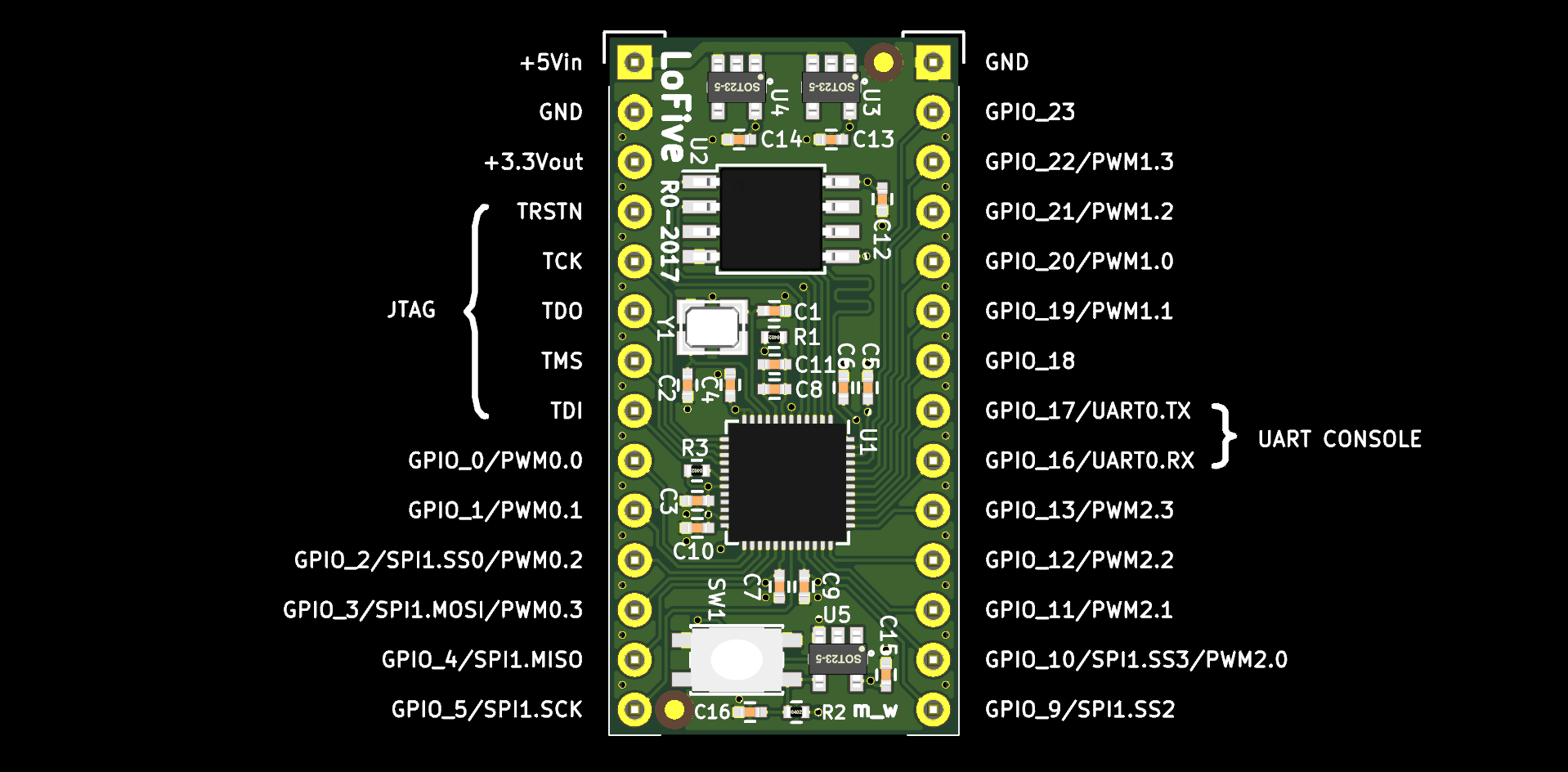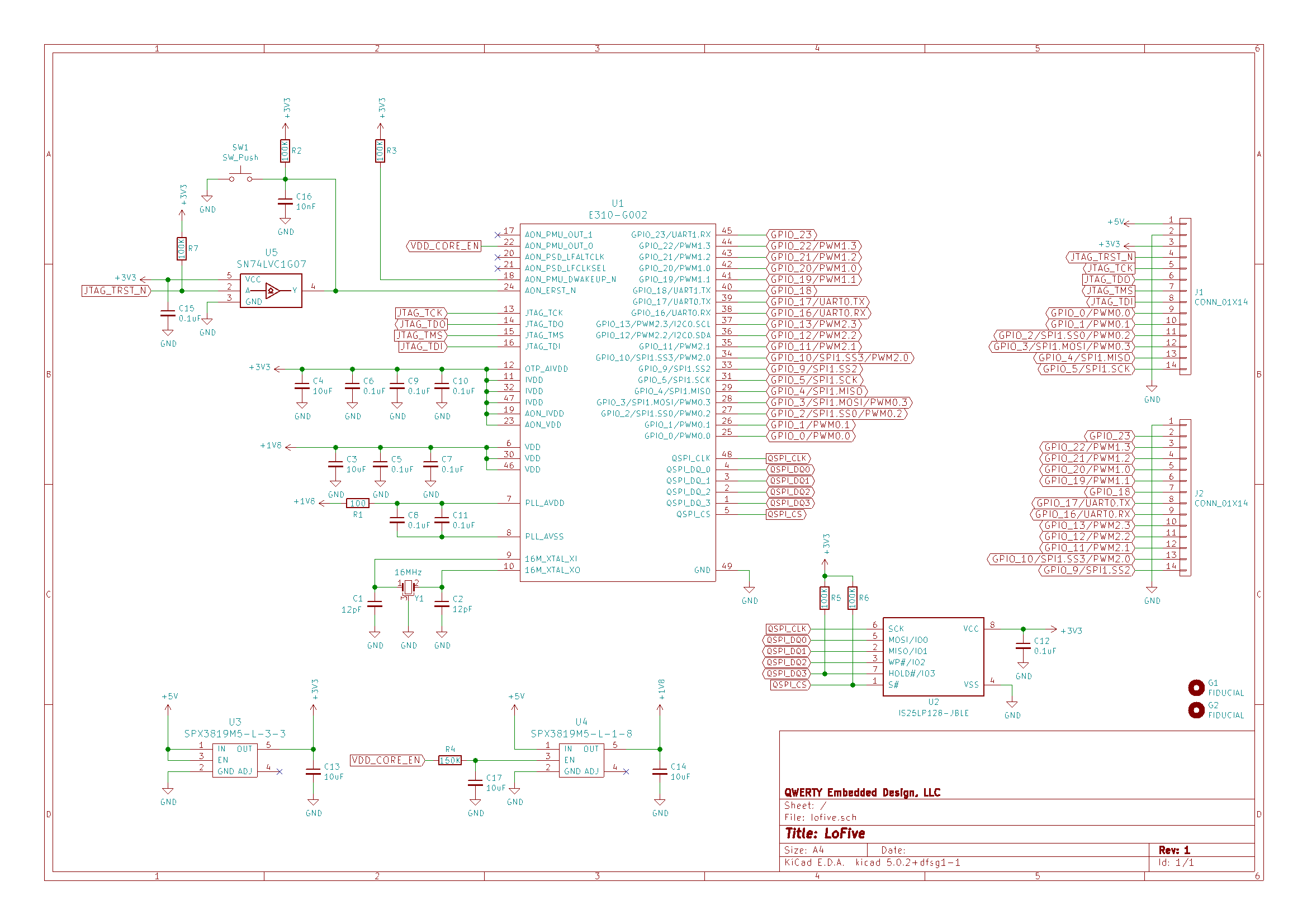-
Notifications
You must be signed in to change notification settings - Fork 11
Home
 LoFive is a lightweight SiFive Freedom E310 open source SoC evaluation kit. The E310 leverages the Free and Open RISC-V Instruction Set Architecture originally developed by UC Berkeley and now has wide industry support via the RISC-V Foundation.
LoFive is a lightweight SiFive Freedom E310 open source SoC evaluation kit. The E310 leverages the Free and Open RISC-V Instruction Set Architecture originally developed by UC Berkeley and now has wide industry support via the RISC-V Foundation.
- Specifications
- Schematic
- Installing LoFive Enabled Freedom-E SDK
- Configuring host for FT2232H-56Q FTDI UART breakout
- Programming using FT2232H-56Q FTDI UART breakout
- Programming to LoFive R0 using the legacy SDK
- Programming to LoFive R1 using the new SDK
- MCU – SiFive Freedom E310 (FE310) 32-bit RV32IMAC processor @ up to 320+ MHz (1.61 DMIPS/MHz)
- Storage - 128-Mbit SPI flash (ISSI IS25LP128)
- Expansion - 2x 14-pin headers with JTAG, GPIO, PWM, SPI, UART, 5V, 3.3V and GND
- Misc - 1x reset button, 16 MHz crystal
- Power Supply - 5V via pin 1 on header; Operating Voltage: 3.3 V and 1.8 V
- Dimensions - 35.56 x 17.78 mm / 1.4 x 0.7 in
- License - CERN Open Hardware Licence v1.2


The Freedom-E SDK port for LoFive hosted here: LoFive Freedom-E SDK
git clone --recursive https://github.com/mwelling/freedom-e-sdk.git
cd freedom-e-sdkgit checkout lofive
git submodule update --init --recursiveNote: The legacy SDK builds the toolchain and utilities from scratch. Refer to the README on this branch for more information.
git checkout lofive-r1
git submodule sync
git submodule update --init --recursiveNote: The new SDK uses a pre-built toolchain and openocd. Refer to the README on this branch for more information.
In order to use the FTDI breakout from a non-root user a few steps are required to enable access.
First the udev rules need to be installed:
wget https://raw.githubusercontent.com/riscv/riscv-openocd/riscv/contrib/60-openocd.rules
sudo mv 60-openocd.rules /etc/udev/rules.dNext add your user to the plugdev group:
sudo adduser $(whoami) plugdevNext restart udev service and logout of the current session:
sudo service udev restart
exitNow a new console, cd into the SDK directory and you should be ready to use the FTDI programmer using the instructions below.
The on-board flash is programmed via JTAG and a special RISC-V version of OpenOCD built into the Freedom-E SDK. LoFive currently supports using the FT2232H-56Q Mini MDL FTDI breakout adapter.
Wire the breakout adapter as follows:
| LoFive Pin | FTDI Breakout Pin |
|---|---|
| +5Vin | VBS |
| GND | GND |
| TRSTN | AD5 |
| TCK | AD0 |
| TDO | AD2 |
| TMS | AD3 |
| TDI | AD1 |
| UART0.TX | BD1 |
| UART0.RX | BD0 |
This will power the board and allow you to program with the LoFive enabled Freedom-E SDK linked above.
Once the SDK is installed and compiled you can load the code via make commands.
For instance to compile and load the LED fade demo:
make software PROGRAM=led_fade BOARD=freedom-e300-lofive
make upload PROGRAM=led_fade BOARD=freedom-e300-lofiveNote: This SDK only supports running on Linux.
Some of the early units of the LoFive may have been deployed without the bootloader installed. If a previously loaded program does not load automatically on reset or power cycle the bootloader is likely not installed.
To program the bootloader to the LoFive run the following from the Freedom-E SDK:
make software upload PROGRAM=double_tap_dontboot BOARD=freedom-e300-lofive-blankmake PROGRAM=lofive-boot TARGET=lofive-r1-bootloader upload Note: You only have to run this once to load the initial bootloader.
make PROGRAM=sifive-welcome TARGET=lofive-r1 upload